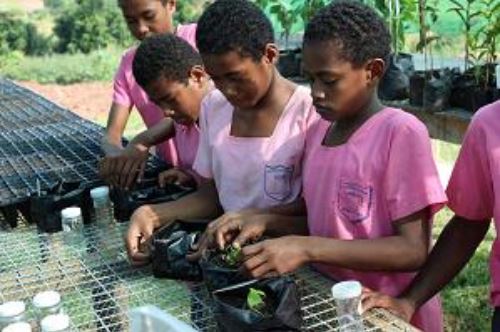The Secretariat of the Pacific Community (SPC) has teamed up with the Fiji Ministry of Agriculture, Fisheries and Forests to establish a nursery in Nagado, Fiji, to help families raise vegetables, crops and trees in their home gardens. This project will help provide a more diverse diet to improve family nutrition and also open up new economic opportunities as community members can sell vegetable products in nearby markets.
To help maximise the benefit to the village, SPC provided a nursery training session for the Nagado community on 27 June 2013. The training was provided through SPC’s Vegetation and Land Cover Mapping and Improving Food Security for Building Resilience to a Changing Climate in Pacific Island Communities project, funded by the United States Agency for International Development (USAID).
Nagado is a farming community located in the Vaturu district in Nadi, where there are few economic opportunities in agriculture and many of the farming methods used are not sustainable. In addition, family nutrition is poor and unvaried, which leads to other health problems. The need for new economic opportunities and better nutrition in Nagado was identified during a recently conducted participatory rural appraisal.
Community vegetable gardening, together with agroforestry practices, has been one of the climate change and food security adaptation interventions identified to supplement food sources for many low-income people in the Sabeto catchment, the USAID project site for Fiji. Community vegetable gardening also teaches young children that food is not a product of the supermarket, but the result of tilling and nurturing the soil. The project aims to enhance the living conditions in Nagado by not only improving nutrition, but also augmenting family income.
The community members, especially women and school children, flocked to the training, eager to learn and to receive hands on experience throughout the day. During the training, the community was taught how to maintain the nursery; how to manage it during cyclones; growing vegetable seedlings; growing sandalwood seedlings; propagation of selected species and varieties of trees by cuttings, grafting and marcotting; transplanting and maintaining climate resistant crops; and pest and disease management. The advantages of organic farming were emphasised at the training, including the ready availability of materials for organic farming, its environmental friendliness, the fact that it provides a balanced supply of nutrients, and its sustainability.
Maria Elder-Ratutokarua, SPC Agriculture and Forestry Policy Officer, also stressed the importance of proper maintenance and management of the nursery to improve food security for the communities.
Nagado Primary School Head Teacher, Meli Cabebula, showed appreciation for the nursery, as it provides a foundation for the community to come together to create family livelihoods and for the children to understand how important it is to grow one’s own food.
SPC and the Ministry of Agriculture will be visiting the village often to follow up on progress at the nursery and community farming, and to also conduct a disaster risk management training workshop in the coming weeks.
Similar nursery training is planned for four other communities in the Sabeto catchment: Korobebe, Naboutini, Narokorokoyawa and Koroiyaca.
Photo Caption: Students of Nagado Primary School transplanting climate resistant crops.
For more information, contact:
Miriama Brown, Land Resources Division,
SPC, Suva, Fiji
(Tel: +679 337 0733; email:This email address is being protected from spambots. You need JavaScript enabled to view it.);
or visit the SPC website: www.spc.int.





CONNECT WITH US